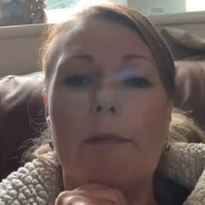Felicity

Felicity began experiencing vaginal and urinary issues at the onset of menopause. After successfully "fighting" her way to having a GP prescribe HRT, her vaginal atrophy, thrush, and urinary tract infections (UTIs) improved. She feels "frustrated" by attitudes toward menopause.
Felicity has two teenage sons and is currently single. She runs her own small business in England. Felicity’s ethnicity is White-British.
Condition: UTI
More about me...
Felicity started regularly contracting vaginal and urinary tract infections (UTIs) in her 40s alongside other perimenopause symptoms. She developed vaginal atrophy, where her vagina felt tender and painful. Felicity also began having debilitating anxiety and panic attacks. Felicity spoke with multiple doctors about her symptoms but had trouble receiving the care she wanted. At the time, she felt as though she would “do anything” to get relief.
She especially struggled with getting her vaginal atrophy addressed, as she felt the doctors were “ignoring me about it”. Getting prescribed hormone replacement therapy (HRT) required “fighting the doctors” until she met with a female doctor in a similar situation. After trial and error with her HRT dosage, Felicity found that her mental health, vaginal atrophy, and infection improved significantly. She currently lives with a low level of urinary incontinence. Still, she thinks this may improve with a “bit more tweaking” of her hormones.
Felicity found it “frustrating” to seek out effective medical care. She was unable to see one regular doctor, so she needed to explain her situation in full with each appointment. Felicity felt that she needed to “sort myself out” and did a lot of research online. She found online support groups helpful, particularly in assuring her that her symptoms didn’t add up to something “more sinister”. Felicity also took on a financial burden by going to private doctors, naturopaths, and acupuncturists in hopes of getting answers. The need to do her research makes Felicity “angry”, as she thinks this is associated with a predominantly male medical profession being under-informed about menopause.
Throughout navigating healthcare for menopause, Felicity has felt that the changes are not taken seriously enough. She believes that women ageing into their 50s and beyond should “still be enjoying our lives” without the burden of hormonal symptoms. Felicity advises that women in similar situations “trust your own instincts”, do research, and not get “fobbed off by your doctors”. She also encourages women to speak to one another about their health and share knowledge. She hopes that the public recognises the impact menopause can have on women’s lives and that they may need additional help.
Felicity’s overall experience with the NHS has been quite positive. Still, she finds they are not focused enough on supporting women “throughout their lives with women’s things”. While she has had issues, she still advises women to stick to their services, as it is possible to “spend a fortune chasing your tail”. Nonetheless, Felicity is open to exploring private treatments such as Botox for the bladder and electrical pelvic floor stimulation for her incontinence in the future.
Felicity is considering Botox for her bladder to avoid future embarrassment from her incontinence symptoms.
Felicity is considering Botox for her bladder to avoid future embarrassment from her incontinence symptoms.
I am suffering with having accidents I have to wear pads when I go to bed and I mean at 48 that’s not cool so that’s the next thing that I want the doctors to address whether or not I’m going to need a treatment or Botox in my bladder or something, I’m just researching at the moment but I am not putting up with being incontinent at the age of 48. But that’s another thing they just, like oh okay, you know, they’re just ignoring it and it’s like can you imagine waking up in the morning, you know, you’re in somebody else’s house and you have an accident, you know, it’s really embarrassing, so I don’t want to live like that so yeah that’s the next thing that I’m fighting for at the moment.
Felicity didn’t know anyone around her dealing with menopause, vaginal atrophy, or incontinence. She found Facebook to be a “really helpful” way to find others with shared experience.
Felicity didn’t know anyone around her dealing with menopause, vaginal atrophy, or incontinence. She found Facebook to be a “really helpful” way to find others with shared experience.
Facebook is the place to go to find other people, other people suffering with the same condition as you are yeah it’s been really helpful. And they give you all sorts of different things that you can watch on YouTube, they give you links to information and yeah no it’s very, very helpful, so.
I’ve joined groups in, on Facebook but it’s, it is quite hard to remember what it was like when it was bad because the brain kind of blocks it out, so I’m feeling a lot better at the moment so that’s a good thing, you know but at the time yeah it was quite daunting. And I haven’t got any females in my family I lost my mum 12 years ago and then there was only my grandmother left and I lost her two years ago, so I’m surrounded by a brother, a dad and two sons so there isn’t really any women that I can ask for any advice on that kind of stuff anyway, and most of my girlfriends aren’t even close really to being perimenopausal I seem to be quite young and I seem to be quite affected by my hormones more than they are and always have been. So yeah it has been a massive learning curve and quite frustrating, you know, you go down one avenue and think oh no it’s not that, I mean for a while I thought it could be my thyroid and could be something else and, but no it’s all hormonal and it really does affect you, you know, don’t underestimate your hormones.

